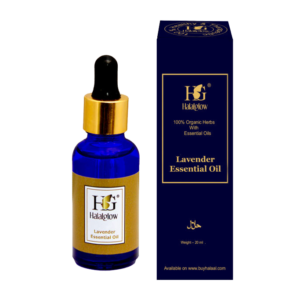-
 Halal Glow Lavender Essential OilProduct on sale₹ 600.00
Halal Glow Lavender Essential OilProduct on sale₹ 600.00
The herb is highly regarded for skin and beauty and is commonly used in fragrances and shampoos to help purify the skin. It can be purchased over-the-counter (OTC) from drugstores, and some versions are used to add flavor to baked goods and foods.
There are also many medicinal properties associated with lavender.
Benefits
Lavender oil is believed to have antiseptic and anti-inflammatory properties, which can help to heal minor burns and bug bites.
Research suggests that it may be useful for treating anxiety, insomnia, depression, and restlessness.
Some studies suggest that consuming lavender as a tea can help digestive issues such as vomiting, nausea, intestinal gas, upset stomach, and abdominal swelling.
In addition to helping with digestive problems, lavender is used to help relieve pain from headaches, sprains, toothaches, and sores. It can also be used to prevent hair loss.
Fungal infections
A study published in the Journal of Medical Microbiology found that lavender oil could be effective in combating antifungal-resistant infections.
The researchers found that the oil was lethal to a range of strains that can cause disease in the skin.
In the study, the essential oils distilled from the Lavandula genus of the lavender plant seemed to work by destroying the membranes of fungal cells.
The study showed that Lavandula oil is potent and demonstrates antifungal activity on a wide spectrum.
Wound healing
A study published in the journal Evidence-Based Complementary and Alternative Medicine compared the effects of several treatments for wound healing.
The researchers compared the effects of transcutaneous electrical nerve stimulation (TENS), saline solution, povidone-iodine, and lavender oil. These were applied to laboratory rats.
The study authors noted that wounds closed faster in the TENS and lavender oil groups than the control groups. These findings suggest that lavender has an acceleratory effect on wound healing.
Hair loss
Lavender is possibly effective for treating alopecia areata. This is a condition in which hair is lost from some or all areas of the body.
Research from 1998 shows that lavender can promote hair growth by up to 44 percent after 7 months of treatment.
USES OF LAVENDER ESSENTIAL OIL
The uses for Lavender essential oil are abundant, ranging from medicinal and odorous to cosmetic. Its many forms include oils, gels, lotions, soaps, shampoos, sprays, and candle making.
Used in aromatherapy, the fragrance is inhaled and scent receptors in the brain’s emotional powerhouse process the smell as calming, allowing the brain and body to relax. Similarly, a few drops smoothed onto a pillow may promote faster onset of deeper sleep with a decreased number of sleep disturbances. Its ability to reduce emotional stress such as anxiety and its potency in alleviating headaches also extends to its ability to reduce feelings of motion sickness and to improve the mood. It is believed that Lavender can reduce symptoms of hay fever when inhaled deeply.
Diluted with a carrier oil and used topically, Lavender oil moisturizes chapped and aging skin. Its anti-septic and anti-fungal properties may help to reduce itching and swelling caused by insect bites. Known to have anti-microbial properties, it provides soothing relief to minor burns and cuts, decreasing pain and inhibiting bleeding while eliminating bacteria from the wound. Its potential to restore skin complexion is also demonstrated with use on aging and acne-prone skin on which it slows the look of aging with its powerful anti-oxidant action and improves the look and feel of skin that is subject to eczema and psoriasis. In hair care, Lavender is known to be an anti-septic that effectively eliminates lice, nits, and dandruff when rubbed into the scalp.
As a spray, Lavender acts as a natural perfume and a non-toxic air freshener that creates a relaxing atmosphere, especially for the bedroom. In the bathroom, it can be sprayed onto towels for a fresh and calming scent.
